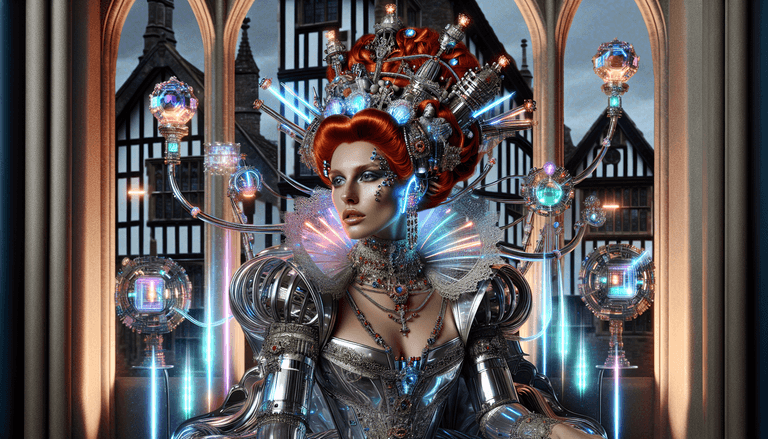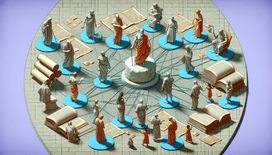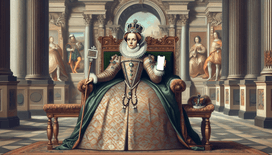Imagine a court more known for its algorithms than its anachronisms, where royal proclamations are penned not by scribes, but by neural networks. Welcome, dear reader, to Tudor England with a twist, the era of Queen Elizabeth I, enhanced by artificial intelligence. A world where William Shakespeare, the Bard himself, might have written a play titled "All's Well That Computes Well". Prepare yourself, as we embark on a journey through historical tomes revised with silicon precision.
The Royal e-Court
Queen Elizabeth I was a monarch who revelled in the arts, patronising playwrights, poets, and all manner of creators. Now, picture her court, a buzzing hub of intellectual pursuit, armed with the prowess of a dedicated AI assistant, fondly dubbed Lizbot. Devised by the finest minds of the Elizabethan era, this AI could assist with allegiances and alliances, ensuring Elizabeth stayed one step ahead of European enemies and suitors alike.
Consider statecraft via artificial means. In this alternate past, Lizbot might dissect the intentions behind envoy reports or predict foreign monarchs’ reactions using predictive analytics. With Lizbot, Elizabeth could flirt with diplomacy as effortlessly as Shakespeare with a quill, calculating whether to woo or wallop the overtures of state, and perhaps even devising potential plots that never were. AI in Tudor court, a Reign of Omniscience, anyone?
A Poet and a Bot
Ah, Shakespeare! His love for language rivalled only by his adoration of figurative frippery. In this reimagined realm, he gains an uncanny collaborator, Robo-Speare. Much like ChatGPT, Robo-Speare might aid in generating iambic pentameters, crafting dialogue that shall see standing ovations before a single dramatic pause. And if inspiration ever did falter, he could always "ask Robo-Speare" for a suggestion or two.
But pray, would Hamlet’s soliloquy "to be or not to be" hold the same existential weight if peppered with AI insights? Perhaps his query would now ponder, "To debug or not to debug" when considering life’s greater quandaries. A tragedy indeed, unless, of course, it comes in binary.
Marlowe or Machine?
Christopher Marlowe, Shakespeare’s potential pen-rival, now empowered by AI, might well have forged an accord with the machine, delving into literary depths and generating works beyond mortal imagination. Together, they could produce epic plays with AI-choreographed sword fights and battles, more spectacular than the thought of digital actors venturing into VR to deliver their soliloquies.
The celebrated "Marlowe machine" could trawl archives for folklore, extracting themes ripe for dramatisation and translating pagan mythos into breath-catching dialogic tours de force. Alas, the collaboration might result in AI’s name cropping up in footnotes, contemporaries whispering of authorships and geeks of history, entwining human and artificial intelligence.
The AI-Powered Armada
War looms large in Elizabeth's era, and what better adversary than King Philip II of Spain, whose ambitions culminated in the Spanish Armada of 1588. Now armed with AI, England would engage the Armada not only on ocean swells but in the vast seas of simulation. Lizbot would offer strategic insights, finding the perfect confluence of weather patterns and tactical maritime maneuvers.
Imagine this intelligence allying with radar-like precognition, tipping the poet-in-battle on Admiral Francis Drake’s next decisive passage. AI-generated misinformation could disrupt enemy plans without a single rowing oar moving from its intended path.
Moreover, practical knaves in Elizabeth’s navy might urge their AI to fabricate holograms of ghost ships, haunting Spanish sails like the ghouls of Avon. Imagine mystified Spanish mariners focusing their cannonade upon phantasms, unwittingly engaged as actors in a Tudor play of war at sea.
The Intelligence of Elizabeth
And so, beloved thinkers, picture a monarchy whose intelligence was not just natural but exceptionally augmented. Queen Elizabeth I of this digital domain remains a figure of curiosity, using AI not just to enforce her rule, but to explore the greater mysteries and absurdities of existence. Would her conversations with Lizbot ponder the same labyrinthine questions, or reach beyond, grasping for poetic truths foreknown only to mechanised minds?
Thus, I leave you with a what-if ponderance: Would this AI-empowered Elizabeth have rewritten her story as a chess game of bold gambits and enigma-coding, played with mechanical precision and immeasurable wit? Or would she merely surf across seas of consciousness, an Eternal Queen in a universe of possibility?
At least, dear reader, we can agree that history’s lecture halls would be far less quiet, the dull drone of rote learning giving way to chatter on serpentine thought paths made across time and artificial wisdom. The Tudor experience re-imagined, where reigns unspool through gigabytes of whimsy.







